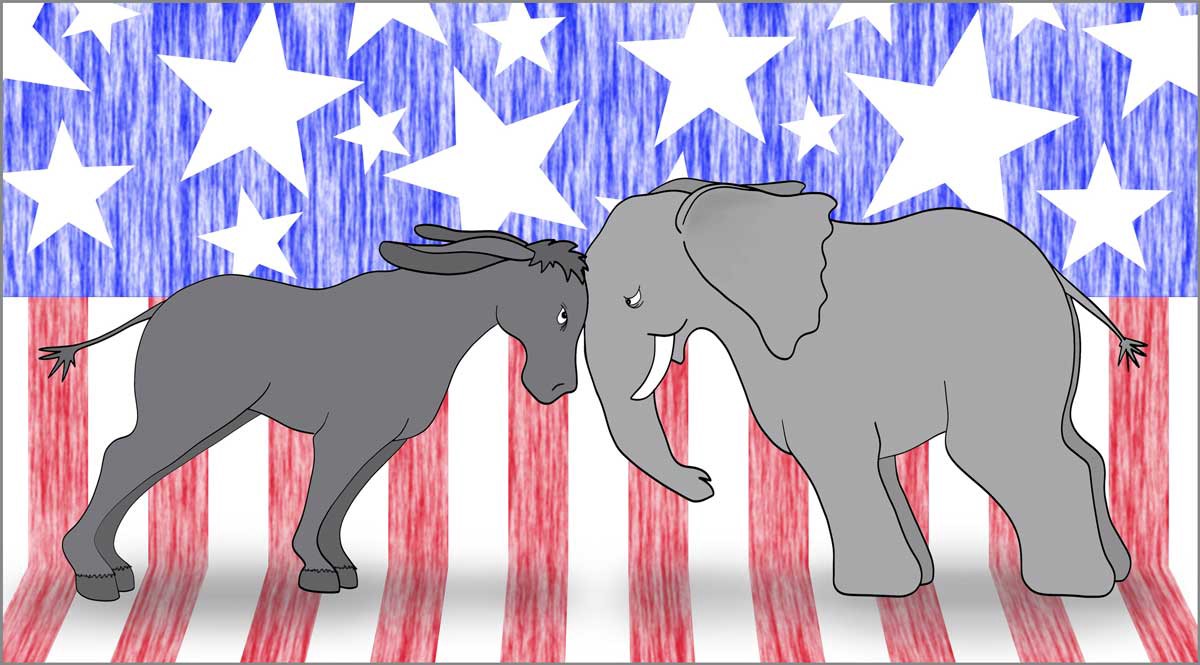American politics has become significantly more polarized and contentious over the past three decades. At the level of elected officials, the political parties are so far apart on most issues that gridlock and inaction have replaced bargaining and compromise as standard practice. The intransigence of elected officials is somewhat puzzling, since voters are by comparison moderate in their policy preferences. Most political scientists believe the ideological disconnect is attributable to several distorting influences, including candidates’ greater responsiveness to donors and activists, whose views are far from representative of ordinary citizens.
Ideological extremity is one standard for assessing polarization. Another metric is the level of hostility and ill will across the party divide. By this standard, it is clear that the electorate is indeed polarized; Democrats and Republicans view their opponents as hypocritical, selfish and closed-minded, and are unwilling to socialize with them, or even partner with them in different types of activities.
Interparty animus is clearly manifest in real-world behaviors — and the pervasiveness of these effects is astonishing. Data from online dating sites reveals that people are just as averse to initiating relationships with political opponents as they are with people of different social status and ethnicity. Marketing studies show that consumers respond negatively to products and companies associated with the opposing party. Overall, party preference has become a litmus test for values and character, eliciting behavioral responses that extend well beyond the political sphere. Political scientists refer to this phenomenon of generalized animosity and distrust toward political opponents as affective polarization.
Affective polarization is thought to be rooted in the psychology of group identity. We Homo sapiens are social animals; group affiliation is essential to our sense of self. When people think of themselves as either Democrats or Republicans, they develop both positive feelings for the in group and negative evaluations of the out group. As in the case of race, gender or religion, party preference is a form of group identity instilled at a very early age, and very resistant to modification.
A key difference, however, is that in the case of race, gender, nationality and other social categories, there are strong social norms that moderate the expression of hostility toward out groups. While racism and sexism are unacceptable, partyism is perfectly legitimate and is considered an appropriate form of cheerleading in the democratic process.
Partisan affect is largely distinct from questions of ideology. Scholars who focus solely on ideological polarization cannot fully explain the divergence of feelings toward co-partisans and opponents; for example, in some settings, affective polarization can increase while ideological divisions shrink. People can take centrist positions on policy issues yet still evince a deep dislike for opponents with similar preferences.
Why does affective polarization matter if it is not closely tied to policy debates? One reason is that partisan animus spills over into nonpolitical arenas and affects both economic and social cooperation. It is one thing to see your political opponents as shortsighted and dogmatic, but quite another when that sentiment intrudes into your market transactions. For instance, one study found that people were willing to work for lower wages from employers who shared their party identification than from those who did not.
Increasing affective polarization portends serious repercussions, especially during times of political turmoil. There are multiple parallels between Watergate and the current era, and yet heightened affective polarization has fundamentally altered the political dynamics of scandal. The cover-up in the Nixon White House was brought to light by investigative news reports that, over time, became widely accepted as credible evidence of official wrongdoing. The media spotlight resulted in a significant erosion of President Nixon’s approval among both Democrats and Republicans.
In contrast, the multiple investigations swirling around the Trump administration have, to date, done little to undermine his standing among Republicans. Disdain for the opposition is so intense that partisans ignore the liabilities and misdeeds of their leaders. This feature of affective polarization — willingness to ignore reasonably objective information that challenges one’s sense of political identity — is disturbing. The real question at this point is whether enough has “gone wrong” that a reserve of shared democratic values will finally find expression to demand higher standards of behavior from public officials. The 2018 midterm elections should be revealing.
Shanto Iyengar is a professor of political science and of communication and Neil Malhotra is the Edith M. Cornell Professor of Political Economy at the Graduate School of Business.



